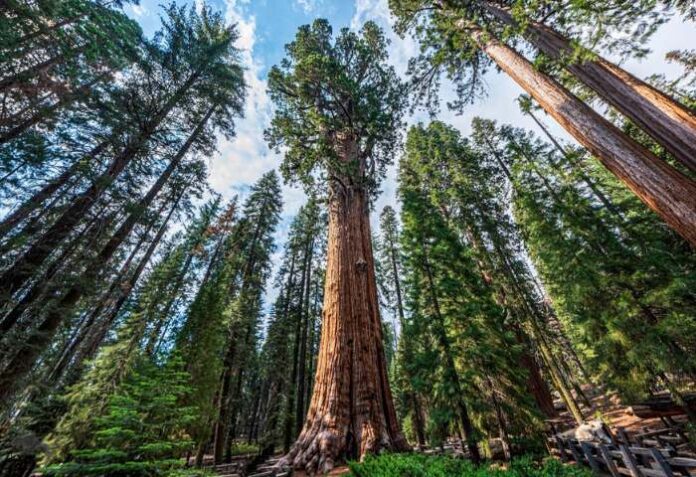Trees are an integral part of the ecosystem, the prominent natural resources on the Earth. Trees are the heart of our Earth; we humans call it our Home. It is the Only reason for LIVING THINGS exists in our world. Let’s see the giant trees in the world. The world is full of different kinds of trees, where the world’s largest trees are determined by their characteristics and the highest wood volume in a single stem. These trees are tall and massive in breadth and, specifically, hold an enormous diameter high up the trunk.
Let’s see the Top 10 Largest Trees in the World and their features.
General Sherman
Recognized as the largest tree in the world by volume, General Sherman is a giant sequoia tree species. It bravely stands in the Sequoia National Park in the Giant Forest of California, United States. The age of the tree is evaluated to be around 2,300 to 2,700 years old. The tree was named by a naturalist, James Wolverton, after his former higher officer. This giant sequoia is the largest known living single-stem tree on Earth by its volume.

- Location: Sequoia National Park, United States
- Trunk Volume: 52,500 Cubic Feet (1,487 cubic meters)
- Height: 83.8 m
Grogan’s Fault
Grogan’s Fault is a coast redwood (Sequoia sempervirens) tree located in the Redwood National Park, California, United States. Also known as coastal redwood and California redwood, Grogan’s Fault is the second largest tree in the world by volume, and its age is estimated at around 1,200–2,200 years. In 2014, Chris Atkins and Mario Vaden discovered this largest known living coast redwood tree.
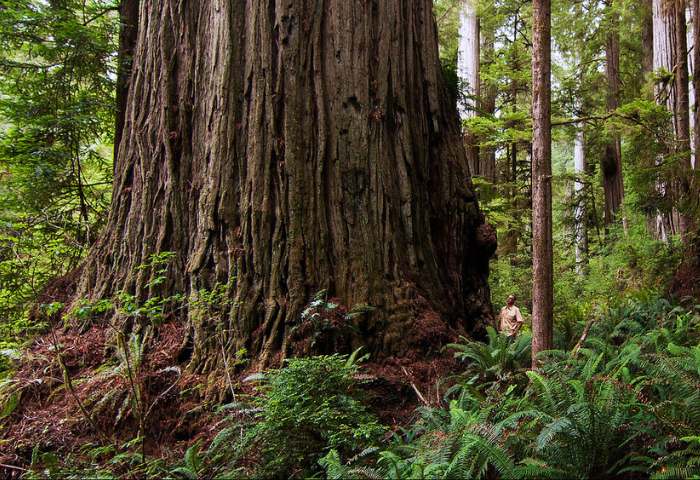
- Location: Redwood National Park, United States
- Trunk Volume: 38,300 Cubic Feet (1,084.5 cubic meters)
- Height: 18.2 m
Tāne Mahuta
A giant kauri tree, Tāne Mahuta, is located in the Waipoua Forest of Northland Region, New Zealand. Also called God of the Forest, Tāne Mahuta is one of the largest trees in the world. The tree’s age is estimated at around 1,250 and 2,500 years. The tree is a leftover of the ancient subtropical rainforest that once grew on the North Auckland Peninsula. Tāne Mahuta is the renowned tree of New Zealand, discovered in the year 1924; also known largest living kauri tree on Earth.

- Location: Waipoua Forest, New Zealand
- Trunk Volume: 18,200 Cubic Feet (516 cubic meters)
- Height: 45.2 m
Quinault Lake Redcedar
The Quinault Lake Redcedar is the world’s largest western redcedar with a volume of 500 cubic meters. About 34 kilometers from the Pacific Ocean, the giant tree was present near the northwest banks of Quinault Lake, north of Aberdeen, Washington. With the volume, Quinault Lake Redcedar is also the largest tree in Washington.

- Location: Washington, United States
- Trunk Volume: 17,650 Cubic Feet (500 cubic meters)
- Height: 55 m
Cheewhat Giant
Located in Canada, Cheewhat Giant is among the largest trees in the world by volume. Cheewhat Giant is a large western red cedar (Thuja plicata) tree discovered in 1988 and got its name from the nearby Cheewhat Lake. Found in Vancouver Island in British Columbia, Cheewhat Giant is the world’s largest living western redcedar.
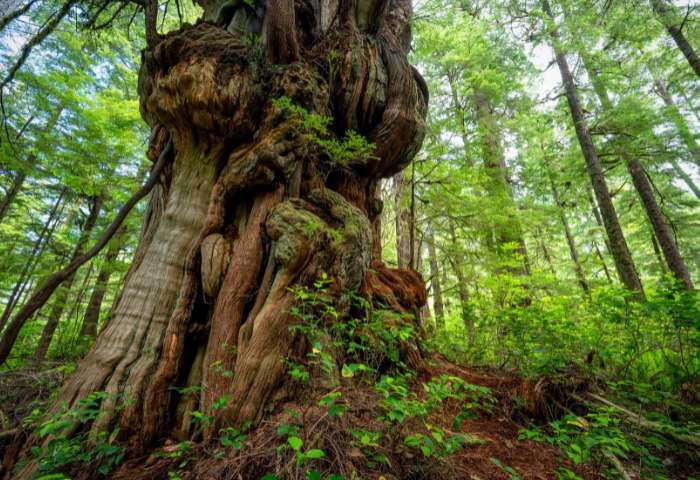
- Location: Pacific Rim National Park Reserve, Canada
- Trunk Volume: 15,900 Cubic Feet (449 cubic meters)
- Height: 55.5 m
Rullah Longatyle
Rullah Longatyle is the world’s largest Eucalypt and largest Tasmanian blue gum (Eucalyptus globulus Labill) tree species. Situated near Geeveston, Tasmania in Australia, Rullah Longatyle is an evergreen tree about 368 cubic meters in volume. While considering the trunk volume, Rullah Longatyle is Australia’s 2nd largest tree.

- Location: Tasmania, Australia
- Trunk Volume: 13,000 Cubic Feet (368 cubic meters)
- Height: 90.7 m
Two Towers
Two Towers, one of the largest trees in the world, is native to Tasmania, Australia. Two Towers (Eucalyptus regnans) is a rare sample of mature regnans with two enormous principal trunks. It comprises 350 cubic meters of wood in its trunks and branches and is around 21m in circumference. The tree’s age is estimated to be 500 years old. Eucalyptus regnans are medium-sized to a tall, straight-trunked tree and the tallest flowering plant on the Earth.
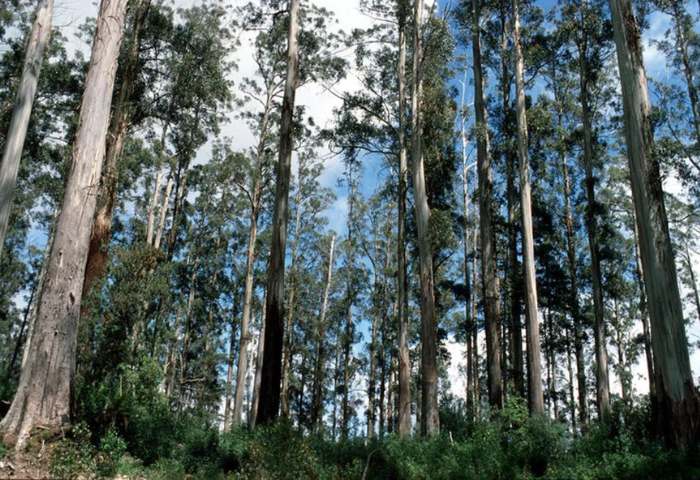
- Location: Tasmania, Australia
- Trunk Volume: 12,600 Cubic Feet (358 cubic meters)
- Height: 75 m
Red Creek Fir
The Red Creek Fir (Pseudotsuga menziesii) is the largest Douglas fir tree on Earth, situated in the San Juan Valley of Vancouver Island in Canada. Considered by volume, Red Creek Fir is one of the top 10 largest trees in the world. Seeded around somewhat 1000 CE, the tree thrived because of its location on the southern inclines of the San Juan Valley and not more than 0.5 km from the San Juan River. Red Creek Fir’s age is estimated at around 1000 years old.

- Location: San Juan Valley, Canada
- Trunk Volume: 12,300 Cubic Feet (349 cubic meters)
- Height: 73.8 m
Queets Spruce
Queets Spruce (Sitka spruce), sits on the shores of the Queets River and at the deme of Sams River, is one of the most imposing conifer trees in the whole Olympic National Park. While considering height, trunk diameter, and crown spread, Sitka Spruce is the largest Spruce species, the 5th-largest conifer, and 3rd-tallest conifer species in the world.
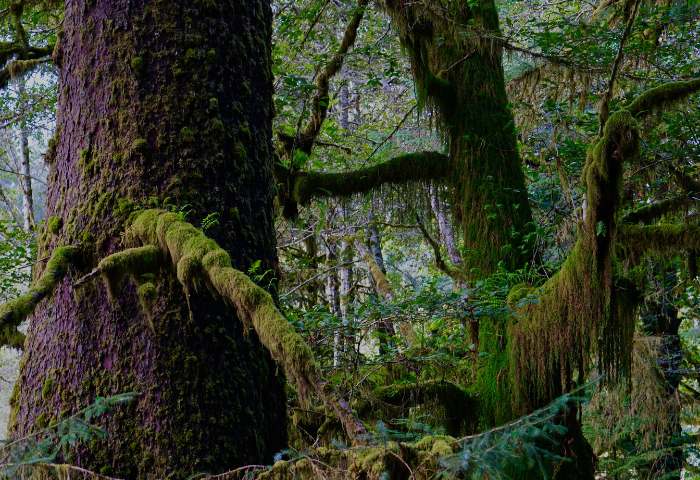
- Location: Olympic National Park, United States
- Trunk Volume: 11,900 Cubic Feet (337 cubic meters)
- Height: 75.6 m
Gothmog
Gothmog (Eucalyptus obliqua) is a tree species native to Styx Valley in south-eastern Australia. Eucalyptus obliqua is an incredibly rough stringy bark tree that grows to a height of 90 meters, and the trunk’s diameter is 3 meters. Gothmog at 337 cubic meters is one of the largest trees in the world.

- Location: Styx Valley, Australia
- Trunk Volume: 11,900 Cubic Feet (337 cubic meters)
- Height: 90 m
FAQ
Which is the second largest giant sequoia tree in the world?
General Grant is the world’s second-largest giant sequoia tree located in Kings Canyon National Park, California, United States.
What are the some other giant sequoia trees located in the Sequoia National Park, US?
President, Lincoln, Franklin, King Arthur, Monre, Adams, Column, Pershing, Diamond, and Hamilton are other giant sequoia trees located in the Sequoia National Park, United States.
